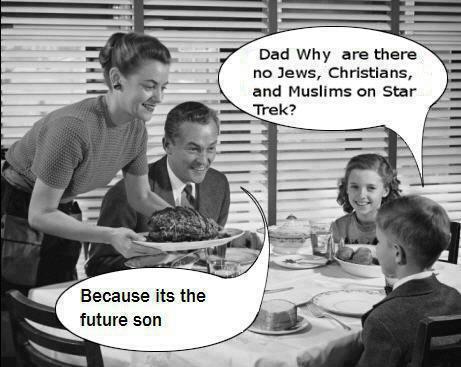Dragonfly Jones
Siiiiiiiilence Punk!!

It’s no secret that there is a lot of atheist perspectives espoused within the Star Trek franchise. And I am certainly not the first to write on the subject. However, with as diverse an audience as the various Trek series has had over the years, with fans around the globe from every walk of life, it seems it must have gone over a lot of heads. Or perhaps the matter is simply overlooked by those who would object to it. There’s no argument that, above all else, it is humanism (which can be embraced by those of almost any creed), which is the overarching philosophy of Star Trek. You might call it it’s Prime Directive.
Nevertheless, it’s apparent to anyone paying attention that in the Trek vision of our future, humanity has moved beyond religious beliefs and superstitions. In fact, even among most other alien races, religious beliefs and practices seem to consist of little more than ritual and mythology, and one is left with the impression that respect for such things is motivated more by cultural relativism than by a sense that they might contain existential truths.
The atheism within Star Trek is hardly subtle. And if there is anyone to whom it is not obvious, then perhaps it’s simply due to the lack of the term being used. And it’s hardly a necessary one. In a future where religious belief isn’t held by the majority, and where present-day faiths have long since gone the way of ancient mythology, there would be little relevance for the word “atheist”. How I would love to see the day when this label, which I currently affirm proudly, is a useless one. But alas, for now I turn to Star Trek, just as so many do for the variety of ambitions they hope will become part of future reality.
This post is meant to be a simple guide to some of the atheism within Star Trek. It will no doubt be rather summary than extensive. There is afterall a lot of ground to cover. But feel free to add to the discussion in the comments section.
We must question the story logic of having an all-knowing all-powerful God, who creates faulty Humans, and then blames them for his own mistakes. — Gene Roddenberry, Free Inquiry (autumn, 1992)
Gene Roddenberry - Creator of Star Trek

Raised as a Baptist, Roddenberry attended church every week with his mother throughout most of his childhood. But since a young age he had the understanding that religion is irrational and silly, saying it “was largely nonsense, largely magical, superstitious things”, and he began to reject the teachings of his church between 14 and 16 years old. As an adult he recalled the religion he was raised in with some disdain. He identified himself as a Humanist. In 1986 he joined the American Humanist Association and remained a Humanist throughout the rest of his life.
STAR TREK, as conceived by Gene Roddenberry, portrays the epic saga of humanity’s exploration of space and, in turn, their own struggles as a species. Every episode and movie of STAR TREK is a morality tale in which human beings find solutions to conflict through enlightenment and reason. Through science. Through wit and intellect. Through a belief in our potential as animals that can supercede our baser instincts. In Gene Roddenberry’s imagining of the future (in this case the 23rd century), Earth is a paradise where we have solved all of our problems with technology, ingenuity, and compassion. There is no more hunger, war, or disease. And most importantly to the context of our meeting here today, religion is completely gone. Not a single human being on Earth believes in any of the nonsense that has plagued our civilization for thousands of years. This was an important part of Roddenberry’s mythology. He, himself, was a secular humanist and made it well-known to writers of STAR TREK and STAR TREK: THE NEXT GENERATION that religion and superstition and mystical thinking were not to be part of his universe. On Roddenberry’s future Earth, everyone is an atheist. And that world is the better for it. — Brannon Braga, International Atheist Conference in Reykjavik Iceland June 24 & 25, 2006

His goal was to portray a very Utopian view of the future. And the Utopia he envisioned was based on his own understanding of humanity and of what humanity is capable.
Regardless of his views on religion, one of the primary tenets of the Star Trek world was the belief in tolerance of those different. Infinite Diversity in Infinite Combinations was a catchphrase used throughout the show that highlighted the many different species, cultures, genders, and ideas that permeated the show all with equal treatment. This IDIC philosophy was not all talk. A certain lack of diversity existed but can easily be chalked up to the more conservative attitude of the 1960s. It’s Star Trek’s firm belief in IDIC that has been the source of much of it’s popularity.
While Roddenberry promoted tolerance, he still lived under the assumption that religion would one day fall away, as would more traditional personal relationships (something else that existed very rarely in Star Trek). And he set out to portray this within his version of humanity’s future. Although, Roddenberry pointed out that the Star Trek universe he imagined in his head was not quite the same as the universe that existed on television. That would have been impossible, as various production and industry concerns shaped the show beyond Roddenberry’s initial vision.
Nevertheless, his intense involvement in both The Original Series and The Next Generation, including reading every script before approving it for filming, assured that his vision was followed as closely as possible despite such constraints. After he died it was the goal of the franchise to continue to honor his vision while continuing to keep it fresh for new audiences. Whether that’s been the case is open to debate.
Last edited:




















